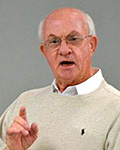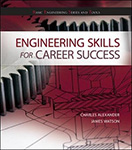The World of Engineering
Category
Published on
Abstract
As graduate students, we can increase our level of success relating to research and developing projects by applying proven steps of project management. This is also important experience for future projects in our professional working careers. This can be accomplished by applying both technical and organization skills and using proven steps to develop outstanding project results. For larger projects, we need to apply additional non-technical skills as we participate effectively as part of a team. One of the best ways to advance our career is by demonstrating how we can work successfully with others.
This presentation, based on the experience of a practicing professional engineer, will provide an overview of both project management and teamwork principles that are easy to use and that have proven to be the best way to plan and implement successful projects. It includes a brief self-evaluation exercise to be completed before the webinar. Additional details relating to the webinar topics will be available in a document to be downloaded following the presentation.
Click here to download the handout Project Mangement and Teamwork
Bio
 Jim received a Bachelor's Degree in Electrical Engineering from Purdue University in 1958, completed post graduate engineering courses at Youngstown State University, and is a graduate of the Executive Management Program at the University of Michigan. He is a Registered Professional Engineer, an IEEE Life-Senior Member, and a Student Professional Development Program National Speaker.
Jim received a Bachelor's Degree in Electrical Engineering from Purdue University in 1958, completed post graduate engineering courses at Youngstown State University, and is a graduate of the Executive Management Program at the University of Michigan. He is a Registered Professional Engineer, an IEEE Life-Senior Member, and a Student Professional Development Program National Speaker.
Following a 36-year engineering and management career with Ohio Edison Company, Jim took advantage of an early retirement opportunity and established Watson Associates to provide programs to incorporate non-technical skill development within existing university engineering technical classes. Watson Associates has directed the use of this program for more than 26,000 students at 14 major engineering universities.
Jim’s IEEE volunteer work with students started in 1975 at Youngstown State University and the University of Akron. He became an IEEE National Speaker in 1982 and joined Larry Dwon on the Student Awareness Task Force to develop Student Professional Awareness Conferences (S-PACs).
Jim received numerous awards from IEEE in recognition for his volunteer activities including the USAB Citation of Honor, USAB Professional Achievement Award, IEEE Third Millennium Medal, RAB Innovational Award, IEEE-USA Citation of Honor, and Robert S. Walleigh Distinguished Contributions to Engineering Professionalism, the highest IEEE-USA award for volunteer activities.
In 2011, IEEE-USA established the “IEEE-USA Jim Watson Student Professional Awareness Award” to recognize key individuals for their contributions to Student Professional Awareness Achievement Activities in the United States. This award has been received by 9 outstanding volunteers to date.
Jim is co-author, with Dr. Charles Alexander, of “Engineering Skills for Career Success” published by McGraw-Hill. This textbook is designed to help engineering students develop and enhance non-technical skills. He has also published 24 articles on career development in Frontiers in Education, IEEE Antennas & Propagation, IEEE Potentials, IEEE Women in Engineering, HKN Bridge, and Wireless Systems Design.
Jim has delivered more than 2,200 presentations in the United States, Canada, Europe, and Asia to a total audience of over 110,000. This includes 75,000 students at 203 different universities who attended 476 IEEE Student conferences and workshops and 913 additional student meetings. Jim was a speaker in 5 conferences at Purdue since 1989.
Sponsored by
Electrical and Computer Engineering, Purdue University
Publications
 Engineering Skills for Career Success
Engineering Skills for Career Success
Charles K. Alexander, James Watson
Engineering skills for career success is to help user develop important skills that will lead them to be significantly more successful in an engineering career. The book explores and applies engineering principles to non-engineering and "soft" skills and helps users effectively develop and enhace the use of these important resource. Engineering skills for career success is primarily based upon many years of observation of successful students and engineers and identifying and applying what has contributed to their success.
McGraw Hill, 2014
ISBN: 978-0-07-338592-1
Cite this work
Researchers should cite this work as follows: